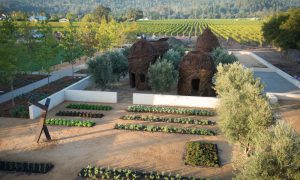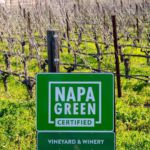Green & Clean: Sustainable Wineries in the Napa Valley
- KIRSTEN MICKELWAIT | THE VISIT NAPA VALLEY BLOG |
- January 17, 2019
The Napa Valley is just 35 miles long and 5 miles wide, but we’re home to more than 400 wineries. Fortunately, most of these are committed to sustainable winemaking. More than 65 percent of Napa Valley Vintners’ members participate in the Napa Green Certified Land and/or Napa Green Certified Winery programs, and more than 40 wineries have comprehensive Soil to Bottle certification in both. Over 55 percent (more than 24,000 acres) of Napa Valley’s vineyard acreage is certified Napa Green Land. It’s clear that our vintners are committed stewards of the land and its resources for future generations of winemakers.
According to Wine Spectator magazine, “sustainable” refers to a wide array of practices that are not only ecologically sound, but also economically viable and socially responsible. Within this general classification, there are several options:
Organic—An organic listing on a wine label means one of two things: It’s either made from organically grown grapes, without any added sulfites, or it’s made from certified organically grown grapes, avoiding all synthetic pesticides.
Biodynamic—This technique is similar to organic farming in that it avoids synthetic chemicals, but it also views the vineyard as an entire ecosystem, observing factors such as astrological influences and lunar cycles. Biodynamic wines are also made without common manipulations such as yeast additions or acidity adjustments.
LEED certification—This certification indicates that the winery itself has been built and is operated in an ecologically sound manner. LEED (Leadership in Energy and Environmental Design) is the most widely used green building rating system in the world and recognizes five key areas of human and environmental health: sustainable site development, water savings, energy efficiency, material selection, and indoor environmental quality.
Here are a few of Napa Valley’s best-known sustainable wineries:
St. Supery Estate Vineyards and Winery was just declared a Global Winner for Sustainable Wine Tourism by Great Wine Capitals. As a Napa Green Land and Winery, it has left more than two-thirds of its 1530+ acres untouched, encouraging biodiversity through a variety of plants and wildlife, integrated pest management, and composting. Over the past three years, the winery has reduced its water usage by 50 percent and its solar panels have saved 923 tons of CO2.
Round Pond Estate Winery practices sustainable wine-growing with natural processes that promote soil health, including erosion control, native cover crops, and composting. It promotes positive plant-soil interactions and emphasizes a reduction in the use of chemicals and pesticides. In addition, Round Pond believes that sustainable wine-growing also supports the people who work the land—treating them fairly and with dignity.
CADE Estate Winery was the first LEED Gold-certified winery in California. It was built with 98 percent recycled materials—including concrete and steel, as well as blue-jean scraps for insulation—and its simple design and earthy colors blend seamlessly into the surrounding landscape. The winery is fully solar-powered and farmed organically, and guests are briefed on its sustainable approaches.
Cakebread Cellars has been a Napa Green Certified Winery since 2008—only the second winery ever to receive the distinction. In 2010, the winery’s team reduced total waste by 12 percent and recycled 81 percent of its total waste. All of its vineyards have been certified in the Napa Green Land program, promoting sustainable farming practices, restoring fish and wildlife habitats, and improving water quality in local streams. In 2010, Cakebread Cellars’ Suscol Springs Vineyard was the first vineyard presented with a sustainability award by the Napa County Resource Conservation District and received recognition as a model hillside vineyard development.
Odette Estate Winery like its sister property, CADE, became LEED Gold-certified in March 2017. It’s a member of California Certified Organic Farmers (CCOF) and utilizes 100 percent organic farming methods, featuring an 8,500-square-foot planted living roof and 2,500-square-feet of solar panels that generate 30,000 kilowatts of solar power per year. The winery building includes polycarbonate paneling to create light without the use of energy, and shipping containers have been recycled into offices and other facilities.
HALL Wines ’ (pictured) winery complex has also earned a LEED Gold Certification. Its vineyards are certified organic, employing only natural products for weed and pest control with careful attention to the natural health and biodiversity in the soil. HALL practices fish-friendly farming practices, plants cover crops to minimize erosion and sedimentation of local waterways, and has incorporated the use of 50 percent biodiesel fuel in its farming operations to reduce its overall carbon emissions.
Spottswoode Winery was one of the first in the valley to adopt organic practices in 1985 (it was certified in 1992). Beth Novak Milliken and Lindy Novak—daughters of the founder, Mary Weber Novak—work with specialists to use biodynamic practices like composting, planting cover crops, and incorporating the lunar calendar. There’s even a charging station for your electric vehicle.
Making the commitment to third party certification takes time and effort, but it is worth it to demonstrate our commitment to the community and to protect our watershed, our land and the air we breathe.
- Susan Boswell, Chateau Boswell Winery



